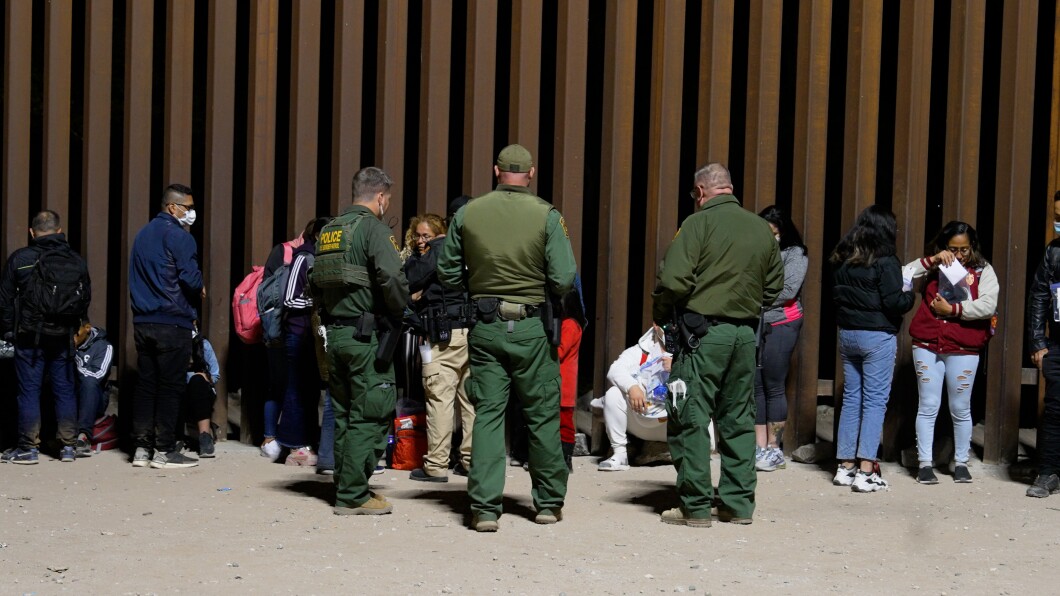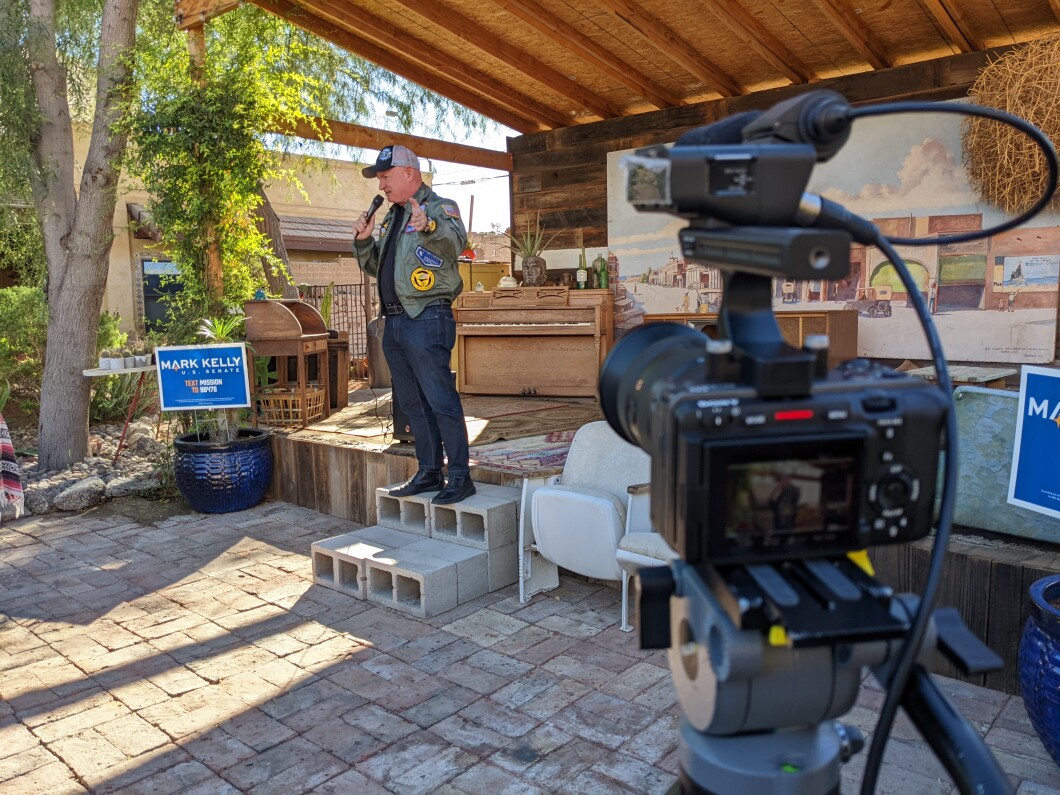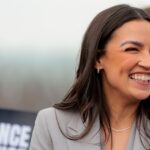
YUMA, Arizona — Every day, from midnight to 7 a.m., hundreds of migrants line up along a stretch of desert along the southern border where Arizona, California, and Mexico intersect and the border wall ends.
Under the shadow of the border wall, a group of migrants appeared out of the darkness around 3:30 a.m., racing to get in line to wait for hours to turn themselves in to Border Patrol near a gap in the wall. The task has become routine for agents here, separating the line of immigrants into groups by nationality and processing those with families first.
“Do you have any kids? If you’re an adult, you made this decision on your own. Get to the back,” an agent shouts in English.

To get to the U.S. border, the immigrants first fly to Mexico City and then to Mexicali, which is only an hour’s drive from the border with Yuma. From there, the migrants wade across the knee-deep Colorado River, where the water level is low and far less treacherous than the Rio Grande in Texas. Migrants from at least 115 countries have been stopped here in the last year. Up to 850 a day are apprehended by Border Patrol agents.
“They have easy access from the two major highways in Baja, California, and in Sonora, where they are able to come directly from the airport,” said Jonathan Lines, Yuma County supervisor and a former chairman of the Arizona Republican Party.
While Customs and Border Protection would not directly comment on the rising numbers, Lines met us at the border at 3 a.m. to give us the lay of the land. Lines, who was born and raised in Yuma, said the surge is draining the resources of both local and federal law enforcement in the region, where 100,000 people reside.
It has also taken a prime role in shaping the unexpectedly close midterm elections in Arizona, home to more than 370 miles of the southern border.
As a presidential candidate, Joe Biden promised to take action to undo the Trump administration’s immigration policies. Now, the Biden administration has been struggling to respond to the surge of immigrants at the U.S.-Mexico border, a problem tracing back to the first months of his presidency. Border officials encountered a record 2.4 million immigrants at the southern border in fiscal 2022, surpassing the 1.7 million set last year, according to numbers from Customs and Border Protection. More than 572,000 of those encounters occurred in Arizona, with apprehensions in the Yuma Sector tripling to 310,094 in fiscal 2022 from 114,488 in fiscal 2021.
The Senate and gubernatorial races in Arizona are tightening. Polling leading up to Election Day showed a dead heat between incumbent Sen. Mark Kelly (D-AZ) and Republican challenger Blake Masters, while Republican gubernatorial candidate Kari Lake inches slightly ahead of her Democratic rival, Secretary of State Katie Hobbs, in her bid to replace outgoing Gov. Doug Ducey.
Immigration appears to be at the heart of most candidates’ closing arguments here.
Republicans are trying to paint Democrats as soft on border security. Lake has vowed to declare Arizona under invasion, a constitutional maneuver akin to a state of emergency, granting officials broad but temporary powers of removal. Controversial and untested, it would likely generate major legal battles with the Biden administration.
“The people in Arizona are tired of it. That’s why we are ahead in the polls. They don’t want President Joe Biden taking control of our border. He’s the one who destroyed a great border plan, and that’s why they are supporting me,” Lake said during a campaign stop in Peoria in October.
In a recent campaign ad, Lake vowed to finish former President Donald Trump’s border wall, “blow up the cartels’ drug tunnels and surveillance drones, and deploy the Arizona National Guard to stop illegals from entering.”
Masters has echoed that message on the stump and in campaign ads.
“It’s like what did these geniuses think was gonna happen when, on Day One, Biden signed away the border wall? I know, you can boo for that. It’s horrible,” Masters said to a crowd at a Halloween-themed campaign event in Mesa. “They surrendered our sovereignty. They gave our southern border up to the Mexican drug cartels. They laid out a welcome mat.”
For his part, Kelly seemed comfortable fighting a campaign on this terrain.
“He’s going to say what he needs to say to try to win an election. My record speaks for itself,” Kelly said of Masters in an interview with the Washington Examiner ahead of a campaign stop in Yuma in late October.
“I’ve spent a lot more time down here than he does, and I’ve actually done something about the border,” he said. “And at the same time, I think we need to treat migrants fairly.”
There is plenty of daylight between Kelly and the Biden White House on immigration, which the senator has been at pains to highlight.
“The administration has at times made some decisions that are not helpful to Arizona. I call the president out on it,” Kelly said, referring to Biden’s decision to end Title 42, a pandemic-era policy that enabled officials to turn away asylum-seekers in the name of public health.
Kelly also is breaking with Biden in calling the situation on the border a “crisis.”
“Arizonans are sick of it. The federal government needs to do more. I’ve worked to bring more money here, more technology, more money for Border Patrol agents,” Kelly said. “Border security is national security, and when there are 2 million asylum-seekers coming across the border in a year, it’s incredibly difficult for Border Patrol to handle that.”

The Arizona Democrat’s campaign dropped a new television advertisement in October in which an Arizona rancher praises Kelly’s record and his ability to “stand up to his own party” when it comes to securing the border.
Kelly, a former Navy pilot and astronaut, and fellow Sen. Kyrsten Sinema (D-AZ) recently co-sponsored a bill to increase Border Patrol staffing, create a reserve force, and raise wages. The bill has bipartisan support but has not been voted on by the full Senate.
Still, some Republican operatives in the state believe Kelly could have done more for the state when it comes to immigration and is not as independent as he portrays himself.
“He hasn’t done much for the border. He gently pushed back on Title 42,” said Barrett Marson, a Republican political strategist in the state. “Sinema has been a thorn in the side of President Biden and has used her precious one vote, the same one vote Mark Kelly has in a tied Senate. She has used that with an incredible advantage to do things for Arizona. Mark Kelly has not done that same thing.”
In contrast, Hobbs has not emphasized immigration while on the campaign trail. She has said she believes border security is a federal responsibility and does not envision the state playing a major role. Although, she said she would ensure communities near the border would receive the resources needed to deal with problems caused by illegal immigration.
MARK KELLY SAYS ‘ARIZONANS ARE SICK’ OF BORDER ‘CRISIS’
Trump’s unfinished border wall is on full display in southern Arizona. Tens of thousands of steel slats, once intended to become part of the wall, sit on the ground near the border, slowly rusting. The posts, most of them reinforced with concrete and rebar, are worth $2.5 million, but it’s unclear what can be done with them since Biden halted the project once he took office in January 2021.
Ducey said he got tired of waiting for the federal government to fill in the holes. The state began installing shipping containers along a 1,000-foot gap near Yuma, setting the stage for a legal showdown with the federal government, which has said the containers were unauthorized and violate U.S. law. So far, Arizona isn’t backing down from the effort. In an interview with 12 News in Phoenix, Kelly said he supports his Republican governor’s actions and understands his frustration over the record number of border crossings near Yuma.
“Border Patrol is having such a difficult time. That’s why after my first visit down to Yuma, I started thinking about and working toward getting those gaps closed in the border wall,” he said.
Bob Bushnell, a retired Border Patrol agent who served for almost 21 years in the Tucson Sector, said there isn’t a straightforward solution but that it feels like the Biden administration is ignoring the problem. He said it should openly speak about the influx and attempt to work with Mexico.
The administration tried to end Title 42, but a federal judge blocked that move in May, and the program has remained in place. The policy doesn’t appear to be effective in places like Yuma. Of the 310,094 immigrants taken into CBP custody in Yuma in fiscal 2022, only about 12% were expelled under Title 42, the lowest number anywhere along the border. Mexico generally only agrees to take in its own citizens and people from Guatemala, El Salvador, and Honduras who are expelled from the United States, making it challenging to send other immigrants back to their home countries due to costs and other considerations.
“A lot of your capability to do that is largely determined by what kind of agreement you can come to with the Mexican authorities in that area,” Bushnell explained.
Immigrants who claim a fear of harm if deported are usually transported out of the Yuma area and released into the U.S. pending a court hearing.
As soon as immigrants are released from the detention center in Yuma, they are given the option to go to Somerton to receive medical assistance, food, and help with making travel arrangements. On the town’s outskirts, about 20 minutes from the border, up to 350 immigrants a day wait underneath a white tent operated by the Regional Center for Border Health, a nonprofit organization that provides services for rural and medically underserved communities across the state. They offer COVID-19 screenings, meals, Wi-Fi access, and travel coordination, so immigrants are able to purchase plane and bus tickets to their U.S. destinations.
“Yuma doesn’t have the transportation infrastructure to support 350 individuals traveling every day. We have a limited, very small airport. We have one Greyhound station with very limited times when they are coming through Yuma,” said Amanda Aguirre, the president and CEO at the Regional Center for Border Health and a former Democratic state senator.
Once immigrants test negative for COVID-19, staff members identify a family member or friend in the country willing to sponsor them and then coordinate transportation. Some are put on buses to Phoenix to catch flights or Greyhound buses to other cities. On a case-by-case basis, the organization can assist in paying for flights to other cities. Some funding the organization is utilizing is from the Federal Emergency Management Agency and Ducey’s office.
“No person gets on a bus without having a destination or coordinated assistance with confirmations of flights,” Aguirre said.
Outside of those destinations, Ducey is sending immigrants only to Washington, D.C. Buses arrive every Monday and Thursday at the administration building in Somerton to pick up 30 to 40 immigrants to make the roughly two-day trip to the nation’s capital. Aguirre said immigrants fill out an acknowledgment form in Spanish, in which they agree they are voluntarily being taken to Washington, D.C. She said the nation’s capital is an ideal destination for some immigrants because of its location. Once in Washington, the immigrants are met by their sponsors or connected to another nonprofit organization to help arrange additional travel.
“These families choose to go on this bus because they don’t have the means to pay for airline tickets,” she said.
The bus trips have been a heated subject on the Arizona campaign trail.
“Not only did they throw open the border and say, come on in, and we won’t deport you. Here’s an incentive. We’re going to pay you. Here’s cash. Here’s a cellphone. I’ve seen these people, these illegal aliens that get on these buses,” Masters said during a campaign event just weeks before Election Day.
“You’ve seen the white buses. We, the taxpayers, are paying for that. They bus them up to Phoenix Sky Harbor Airport, and the Biden administration has been running midnight flights out of Phoenix Sky Harbor, flying illegal aliens to wherever they want to go in our country,” he said as a crowd in Mesa booed.
Both candidates running for Arizona governor have said they plan to stop the policy if they are elected to office, with Lake equating it to human smuggling.
Despite all of this, an overwhelming number of Yuma residents, including Democrats and Republicans, support the initiative.
“We appreciate [Aguirre’s] work. She takes the pressure off,” Lines said in a text message.
CLICK HERE TO READ MORE FROM THE WASHINGTON EXAMINER
Preelection data published by Gallup showed voters nationally rank immigration as only fifth in their list of priorities. But in Arizona, there’s reason to believe it is more decisive. A recent CBS News poll found immigration ranks third in the state as being “very important,” just behind the economy and inflation. Arizona voters in both parties said immigration is top of mind when they head to the ballot box.
Sheila Watson, a registered Republican in Scottsdale, said her top concern is immigration.
“Stopping illegal immigration is my No. 1 issue because we are in a border state and it puts our kids’ safety in jeopardy. The fentanyl is not being talked about enough, but it is just pouring through,” she said.
Zahid Plantillas, a registered Democrat in Yuma, lives eight blocks from the border. He said he has personally seen how the flow of immigrants has become a problem in his community. But he said he doesn’t blame the Biden administration or Arizona Democrats for the crisis.
“We really need to figure out what we are going to do about that. We need a concrete set of policies, and we need to follow through and actually have a plan in place,” he said.
Democratic state Rep. Brian Fernandez, who is running for a state Senate seat, admitted immigration can be a political liability for Democrats outside urban areas, as opposed to his own in Yuma.
“This is one of the few rural districts a Democrat holds, is my district, one of the ones where people really worry about this. Urban areas — the issues are a little bit different. People who live along the border have unique concerns,” Fernandez said.
Samantha-Jo Roth is a congressional reporter for the Washington Examiner.






